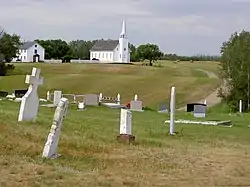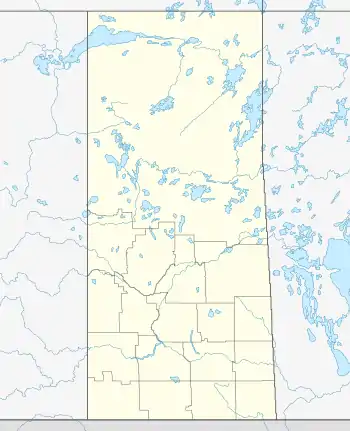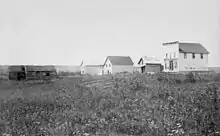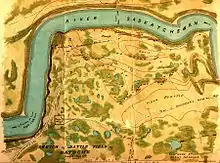Batoche, Saskatchewan
Batoche, Saskatchewan, which lies between Prince Albert and Saskatoon, was the site of the historic Battle of Batoche during the North-West Rebellion of 1885. The battle resulted in the defeat of Louis Riel and his Métis forces by Major General Frederick Middleton and his Northwest Field Force. Batoche was then a small village of some 500 residents. The site has since become depopulated and now has few residents. The 1885 church building and a few other historic buildings have been preserved, and the site is a National Historic Site.
Batoche | |
|---|---|
 Church, rectory and cemetery of Saint Antoine de Padoue in Batoche | |
 Batoche | |
| Coordinates: 52.755°N 106.116°W | |
| Country | Canada |
| Province | Saskatchewan |
| Region | Southcentral Saskatchewan |
| Census division | 15 |
| Rural Municipality | St. Louis No. 431 |
| Established | 1872 |
| Incorporated (village) | 1885 |
| Designation (National Historic Site) | 1923 |
| Government | |
| • administrator | Louise Hodgson |
| • Governing body | St. Louis No. 431 |
| Time zone | CST |
| Postal code | S0J 1E0 |
| Area code | 306 |
| Highways | Highway 225 |
| Waterways | South Saskatchewan River |
| Official name | Batoche National Historic Site of Canada |
| Designated | 1923 |
| [1][2][3] | |
History


The Métis settlement of Batoche (named after Xavier Letendre dit Batoche) was established in 1872. By 1885 it numbered 500 people. The Métis of the area settled on river lots, and the community contained several stores as well as the Roman Catholic Church of St. Antoine de Padoue at the time of the Rebellion. Batoche was the de facto capital of Riel's Provisional Government of Saskatchewan.
Batoche is a Southbranch Settlement. It is situated mainly along the east bank of the South Saskatchewan River between St. Laurent and Fish Creek. This area is part of the aspen parkland biome.
This community consisted mostly of Francophones and Roman Catholics.[4][5]
Batoche National Historic Site
Batoche was declared a National Historic Site in 1923.[6] The visitor centre features a multimedia presentation about the history of the community and its inhabitants. There are several restored buildings with costumed interpreters who depict the lifestyles of the Métis of Batoche between 1860 and 1900. The sites include a North-West Mounted Police encampment, a church and rectory complex, and a farm home. The sites are set at different locations around the community. The complex is open from mid-May through mid-September.
In popular culture
- In 1989, Ralph D. Witten's short story "Batoche" was read on CBC Radio by Wendell Smith[7]
See also
References
- National Archives, Archivia Net, Post Offices and Postmasters, archived from the original on October 6, 2006
- Government of Saskatchewan, MRD Home, Municipal Directory System, archived from the original on January 15, 2016
- Canadian Textiles Institute. (2005), CTI Determine your provincial constituency, archived from the original on September 11, 2007
- "French and Métis Settlements". Encyclopedia of Saskatchewan. Canadian Plains Research Center, University of Regina. 2006. Archived from the original on November 9, 2013. Retrieved September 17, 2013.
- Henry Thomas McPhillips (1888), McPhillips' alphabetical and business directory of the district of Saskatchewan, N.W.T.: Together with brief historical sketches of Prince Albert, Battleford and the other settlements in the district, 1888 (pages 93-97), Prince Albert, NWT: Henry Thomas McPhillips
- Batoche. Canadian Register of Historic Places. Retrieved 6 August 2012.
- Smith, Wendell (1989). "Wendell Smith Reads Ralph D. Witten's 'Batoche'". CBC Radio: Alberta Anthology.
Further reading
- Barnholden, Michael. (2009). Circumstances Alter Photographs: Captain James Peters' Reports from the War of 1885. Vancouver, BC: Talonbooks. ISBN 978-0-88922-621-0.
- Dumont, Gabriel. Gabriel Dumont Speaks. Talonbooks, 2009. ISBN 978-0-88922-625-8.
- Payment, Diane p. (2009). The Free People - Li Gens Libres University of Calgary Press. ISBN 978-1-55238-239-4.